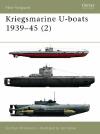The Boat
Buchheim, Lothar-Günther
1999, Orion Military
ISBN 0304352314
Paperback, 563 pages
| Type. | Novel |
| Pros. | Widely regarded as a masterpiece of World War II fiction |
| Cons. | Some may find it a difficult read |
| Rating. |  |
 Although this book is a work of fiction, it is based on the author's experiences as a war correspondent on U-96. Those who have come to know the story through the movie may be unaware that it has been a controversial book since its publication. Also, although the movie follows the book quite faithfully, those who like the movie may still not like the book at all.
Although this book is a work of fiction, it is based on the author's experiences as a war correspondent on U-96. Those who have come to know the story through the movie may be unaware that it has been a controversial book since its publication. Also, although the movie follows the book quite faithfully, those who like the movie may still not like the book at all.
First, the controversy. It is confined mainly to the circle of those who actually experienced the events of the U-boat war, that is, Buchheim's contemporaries, the U-boat men. When this book was first published, it had its share of enthusiastic supporters among U-boat veterans, but raised a storm of protest from others. It sparked a feud between the two camps that smolders to this day. The objections: the book did not accurately portray the reality of life onboard a U-boat and the behavior of its crew; and the book, like Buchheim's other (later) works, criticized Dönitz.
Specifically, U-boat veterans objected to Buchheim's harping on the mundane but seamy side of the campaign - boredom, seasickness, drunkenness and petty criminal acts committed on leave, the crewmen's obsession with sex - and his portrayal of the fear of the men under fire. His detractors point out that he was an outsider, a Propaganda-Kompanie man, not a trained U-boat man, and claim that the seasickness and terror under fire were his own only and did not extend to the U-boat's crew. Karl-Friedrich Merten, one of the top aces of the war, wrote his own book in reply, entitled Wir U-Bootfahrer sagen: "Nein! So war das nicht!" [We U-boat men say: "No, it wasn't so!"].
Buchheim's supporters generally agree with the content of the book, going as far as to assert that the experience of the Atlantic war was exactly as he described it. But even they tend to disapprove of what they consider the sensational aspects of the book, the drunkenness and debauchery seen most strikingly in the opening scenes of both book and movie.
The book also revealed two camps of opinion about Dönitz: those who believed he was a great tactician and wise leader who always took care of his men and did everything possible to win the Battle of the Atlantic - and those who thought he made unforgivable mistakes and sent thousands of young men to their deaths in "iron coffins" with the full knowledge that their sacrifice would achieve little. Those who had considered themselves and their fellow servicemen dutiful and selfless heroes did not enjoy being cast as victims; those who felt bitterness for their lost comrades and lost youth felt some satisfaction that the truth was being told at last.
The style of the book itself accounts for the varying opinions of its readability. It might best be described as impressionistic, as indeed Buchheim's purpose is to convey his impressions of a U-boat mission: boredom punctuated by bursts of heart-stopping action, stinks, bad food, bad weather, and the feeling that one is "frigging around," wandering aimlessly about the vast ocean with little hope of accomplishing anything. The language is often flowery, the word-pictures are many, and Buchheim succeeds in his intention that we should be both as bored and as frightened as he was. Those who enjoyed the fast-paced action of the movie may find the book tedious and long-winded, but those who have the patience will come away with an inkling as to what life on board a U-boat in the stormy wartime Atlantic could be like.
Review written by Tonya Allen.
Published on 26 Nov 1999.
This title is highly recommended.
Purchase information: (info) Get The Boat now at amazon.com ($ 9.95)
Get The Boat now at amazon.com ($ 9.95)
Return to our main review page.



